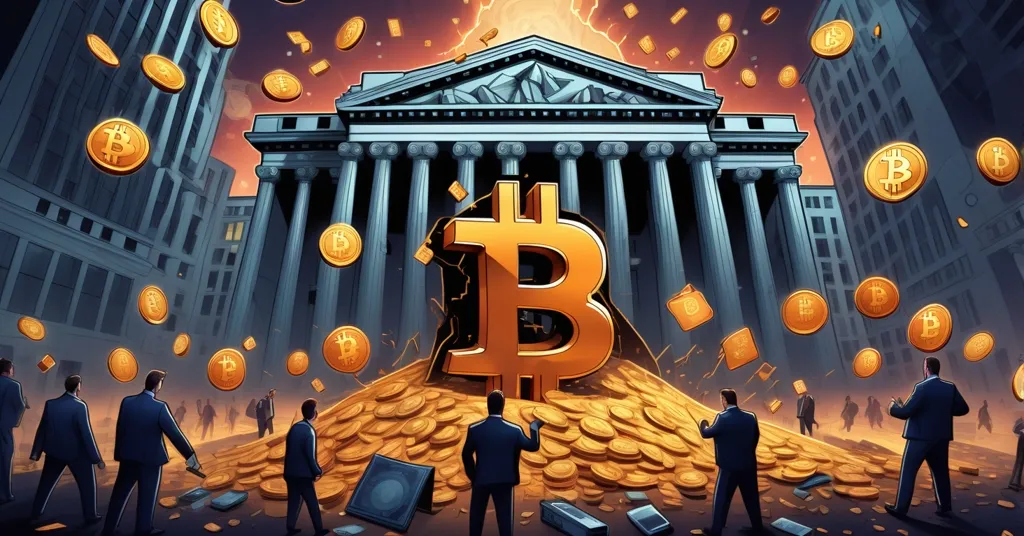US Bitcoin Reserve Uncertainty and Google Wallet Policy Stir Crypto Controversy

US Bitcoin Reserve Chaos and Google’s Wallet Fumble Fuel Crypto Debates
The crypto sphere is a whirlwind of contradictions right now, with the U.S. government’s indecisiveness on its Strategic Bitcoin Reserve clashing against Google’s regulatory misstep on digital wallets, alongside market wins and personal dramas. This is the raw, unfiltered pulse of a revolution in finance—full of promise, peril, and plenty of head-scratching moments.
- US Bitcoin Reserve Uncertainty: Treasury Secretary Scott Bessent’s flip-flopping on expanding the $15-20 billion reserve has Bitcoin advocates up in arms.
- Google’s DeFi Scare: A short-lived policy targeting digital wallet apps on Google Play rattled the DeFi community before exemptions were clarified.
- Market Moves and Controversies: Bullish Global’s Nasdaq triumph, Justin Sun’s privacy war with Bloomberg, and the Trump family’s DeFi push amid debanking battles dominate headlines.
Policy Battles: US Bitcoin Reserve Caught in a Tug-of-War
Let’s cut to the heart of the biggest frustration for Bitcoin maximalists: the U.S. Strategic Bitcoin Reserve. This government-held stockpile, built from Bitcoin seized in criminal forfeitures, sits at an impressive $15-20 billion as of recent estimates. Launched with fanfare in March, it was framed as a step toward positioning the U.S. as a dominant force in the crypto realm, with bold rhetoric about becoming the “Bitcoin superpower of the world.” Hopes soared—along with Bitcoin’s price, hitting a record $124,128—on rumors that the Treasury might actively buy more BTC with federal funds. Then came the buzzkill. Treasury Secretary Scott Bessent flat-out dismissed the idea of additional purchases, sending shockwaves through the community. For more on this ongoing uncertainty, check out the latest confusion surrounding the U.S. Bitcoin Reserve policy.
“We are not going to be buying that, but we are going to use confiscated assets and continue to build that up… [We are] going to stop selling any BTC already in our possession,” Bessent stated.
Just as the outrage peaked, Bessent took to social media with a vague pivot that only muddied the waters further.
“Treasury is committed to exploring budget-neutral pathways to acquire more Bitcoin to expand the reserve, and to execute on the President’s promise to make the United States the ‘Bitcoin superpower of the world.’”
What exactly is a “budget-neutral pathway”? For those not steeped in policy jargon, it likely means finding ways to acquire Bitcoin without increasing government spending—think reallocating existing funds or leveraging other assets. Sounds clever, but it’s a far cry from the decisive action many Bitcoiners crave. The market felt the whiplash too, with BTC dipping below $118,000 after Bessent’s initial comments and fresh inflation data spooked investors. Price swings like this are nothing new in crypto; speculation and policy noise can turn sentiment on a dime. But for those of us who see Bitcoin as the bedrock of a new financial order, this wishy-washy stance is infuriating. Compare the U.S. to El Salvador, which went all-in on Bitcoin as legal tender in 2021, risks and all. Meanwhile, we’re stuck in a bureaucratic holding pattern while other nations like Bhutan and Germany flirt with their own reserves. Are we leading the global charge, or just playing it safe to avoid ruffling fiscal feathers? For a deeper look into Bessent’s statements, see the 2025 updates on the U.S. Strategic Bitcoin Reserve.
Looking ahead, the lack of a concrete policy leaves room for speculation. Will Congress step in to force clarity, or are we waiting on a Treasury report that might never come? Bitcoin’s role as a strategic asset hangs in the balance, and for maximalists like myself, anything less than full commitment feels like a betrayal of the vision for decentralized money. If you’re curious about the broader context, explore the detailed explanation of the U.S. Bitcoin Reserve policy.
Debanking and Trump’s DeFi Gambit: Financial Freedom or Flashy Branding?
Staying in the policy arena, the Trump family’s foray into decentralized finance (DeFi) through World Liberty Financial (WLF) adds another layer of intrigue. For the uninitiated, DeFi refers to blockchain-based financial systems that cut out traditional middlemen like banks, often running on smart contracts via platforms like Ethereum. Eric and Don Jr. Trump, co-founders of WLF, recently secured a $1.5 billion deal with ALT5 Sigma, boosting the valuation of their WLFI tokens from 1.5 cents to 20 cents. Notably, Justin Sun, a polarizing figure we’ll get to soon, holds $75 million in WLFI, potentially worth $1 billion at current levels. The Trumps frame their crypto push as a direct response to “debanking”—being iced out by traditional financial institutions after the January 6, 2021, Capitol events.
“Capital One stripped 300 bank accounts from me … after doing business for 20-something years … this happened across the board,” Eric Trump claimed.
President Trump has since issued an executive order barring federal agencies from allowing banks to deny services, a clear shot at combating debanking. This hits a raw nerve for many in crypto, where the ethos of financial sovereignty resonates with anyone who’s ever been screwed over by a bank. But let’s not get starry-eyed. Is WLF a genuine DeFi innovator, or just a shiny branding exercise with questionable tokenomics? WLFI tokens are often pitched for governance or staking in DeFi projects, but if their utility isn’t clear, they risk being pure speculation—a common pitfall with celebrity-backed crypto ventures, many of which have flopped due to low adoption. Skepticism aside, the broader debanking issue isn’t just a Trump family sob story. Since allegations of Operation Choke Point 2.0 in 2023, over 30 smaller crypto firms and countless NFT creators have reportedly lost bank access, per industry estimates, forcing reliance on decentralized systems.
Adding fuel to this fire, a coalition of fintech and crypto giants—including Gemini, Kraken, and PayPal—has urged Trump to block major banks like JPMorgan Chase from slapping fees on data aggregators. These fees threaten to erect new barriers to financial access, further alienating innovative sectors. The clash between old finance and new is glaring, and while Bitcoin remains my north star, DeFi’s role in offering alternatives can’t be ignored—even if projects like WLF come with baggage. The real question is whether high-profile names will drive meaningful adoption or just distract with hype. For community discussions on related treasury decisions, see this Reddit thread on U.S. Bitcoin Reserve strategies.
Market Momentum: Bullish Global’s Nasdaq Splash Signals Maturity
Shifting from policy quagmires to market action, Bullish Global, a digital asset exchange and media company behind CoinDesk, roared onto Nasdaq on August 13. Raising $1.1 billion at $37 per share, it achieved a staggering $5.4 billion valuation. Shares rocketed to $118 on debut, settled at $70, and edged up to $74.63 the following day. This isn’t just a win for Bullish—it’s a beacon of investor confidence in crypto’s mainstream potential, especially at a time when regulatory shadows loom large. Contrast this with TRON’s underwhelming Nasdaq debut in late July, where shares slumped to $6.98, and you see a market that’s growing discerning. Investors aren’t throwing cash at every blockchain name; they’re rewarding credibility over empty buzz. For more on this milestone, read about Bullish Global’s Nasdaq IPO and its market impact.
Why does Bullish’s success matter? Beyond the numbers, it signals a maturing crypto space where public listings can legitimize operations and draw institutional money—key for broader adoption. Yet, as a Bitcoin purist, I can’t help but grumble that altcoin-focused firms often divert attention from BTC’s core mission as sound money. There’s also a flip side: overvaluation risks. If market sentiment sours or regulatory crackdowns intensify, today’s darling could become tomorrow’s cautionary tale. Still, for now, Bullish’s ascent is a reminder that while Bitcoin is king, the broader blockchain ecosystem fuels visibility and infrastructure that indirectly bolster the entire space. Can this momentum hold, or are we riding a bubble waiting to pop?
Privacy on Trial: Justin Sun’s War with Bloomberg Exposes Crypto’s Dark Side
While market wins lift spirits, personal risks remind us of crypto’s grittier realities. Enter Justin Sun, the controversial founder of TRON blockchain, who’s suing Bloomberg in a Delaware federal court. The issue? Bloomberg’s Billionaires Index detailed Sun’s crypto wealth—pegged at $12.3 billion, including 60 billion TRX, 17,000 BTC, 224,000 ETH, and 700,000 USDT. Sun, who reportedly owns 90% of HTX exchange despite denials and acquired BitTorrent for $140 million in 2014, argues this exposure endangers him. For specifics on this legal battle, see the details of Justin Sun’s privacy lawsuit against Bloomberg.
“Publishing the data will allow ‘bad actors’ to identify his digital wallets and make him a ‘considerable target’ for theft, extortion, and physical attack,” Sun’s legal team asserted.
Bloomberg counters that the data was already public and restricting further reporting violates First Amendment rights. Sun also disputes the figures, claiming they attribute assets he doesn’t own while omitting others, with Bloomberg itself rating its confidence in the data at a measly 1/5 stars. Let’s be real: Sun’s paranoia isn’t baseless. Blockchain transparency—a feature, not a bug—means anyone with on-chain analysis skills can track whale wallets. Think of it as a public ledger anyone can read, but one that also exposes personal wealth to prying eyes. Past horrors, like the 2018 kidnappings of crypto holders or relentless exchange hacks, prove the stakes are real. This isn’t just Sun’s fight; it’s a stark warning for every crypto user balancing the ethos of open ledgers with the need for personal safety.
Zoom out, and this clash mirrors crypto’s core tension: decentralization demands transparency, but at what cost to individuals? Bitcoiners cheer trustless systems, yet high-profile figures become walking targets. There’s no easy fix—privacy tools like mixers or zero-knowledge proofs exist, but they’re often misunderstood or tied to illicit activity in regulators’ eyes. Sun’s battle is a microcosm of a dilemma we’re nowhere near solving. Will public wealth data always haunt crypto’s elite, or can tech evolve to shield without compromising principles?
Tech Tensions: Google’s Wallet Policy Blunder Sparks DeFi Outrage
Big Tech isn’t winning any popularity contests in the crypto crowd either. On August 13, Google dropped a bombshell policy for digital wallet apps on its Google Play store, mandating FinCEN registration or banking charters. For clarity, digital wallets are apps or tools that store crypto assets; they come in two flavors—custodial, where a third party holds your funds (think exchanges like Coinbase), and non-custodial, where you control your private keys, ensuring full ownership and privacy. Google’s initial rule seemed aimed at choking DeFi—those blockchain-based financial apps bypassing banks—by imposing traditional finance burdens on tools built for decentralization. The community backlash was immediate and brutal, with fears that innovation would be crushed under regulatory pretense. For insights into this policy shift, check out the Google Play digital wallet policy update for 2025.
Fortunately, Google reversed course, clarifying that non-custodial wallets are exempt. This aligns with FinCEN’s 2019 guidance that such tools typically aren’t considered money transmitters under U.S. law—a crucial win for user control and privacy. But let’s not pretend this was altruism; the about-face likely came from the crypto world raising absolute hell. Big Tech playing regulator is like a fox guarding the henhouse—don’t be shocked when feathers fly. This incident exposes the fragile dance between tech giants and decentralized systems. One misstep, and entire swaths of innovation could be throttled under the guise of compliance. It’s a bitter reminder that while Bitcoin and blockchain promise financial freedom, the internet’s gatekeepers aren’t always allies. Will Google’s retreat hold as a precedent, or is this just a pause before tighter control? For speculative thoughts on how such policies could affect DeFi, see this discussion on Google Wallet policy impacts.
Key Questions and Takeaways for Crypto Enthusiasts
- What’s the actual status of the U.S. Strategic Bitcoin Reserve?
It’s a $15-20 billion stockpile from seized assets, but expansion is uncertain. Treasury Secretary Bessent first rejected purchases, then teased “budget-neutral” options—meaning no extra spending, possibly reallocating funds. Without a firm policy, it’s all guesswork and frustration for Bitcoin advocates. - Does Bullish Global’s IPO prove crypto is going mainstream?
Largely, yes. With a $5.4 billion valuation and shares nearly doubling on debut, it shows strong investor appetite for credible crypto ventures, unlike TRON’s flop. It signals market maturity, though risks of overvaluation persist. - Why should Justin Sun’s lawsuit against Bloomberg concern crypto users?
It underscores blockchain’s double-edged transparency—public data can make wealth holders targets for theft or harm. Sun’s case highlights a critical privacy gap in a space built on open ledgers, a risk for anyone with significant holdings. - Is the Trump family’s DeFi project WLF a game-changer or just hype?
Their push with WLF spotlights crypto’s appeal against debanking, but skepticism around token utility and motives suggests it’s more branding than breakthrough. Real adoption needs substance, not just celebrity names. - What does Google’s wallet policy reversal mean for DeFi’s future?
Exempting non-custodial wallets is a victory for user control and privacy, per FinCEN guidance, but the initial blunder reveals how easily Big Tech or regulators can threaten innovation if community pushback falters. - Are debanking and bank fees a real threat to crypto and fintech?
Absolutely. From the Trumps to small players, exclusion by banks like JPMorgan and new data fees create systemic hurdles, making decentralized systems like Bitcoin and DeFi not just appealing but essential for financial access.
Peering through the chaos of policy waffling, privacy battles, and tech overreach, the fight for a decentralized future remains an uphill slog. Bitcoin stands as the ultimate defiance against a broken status quo—a sound, censorship-resistant money for the people. Yet, altcoins and DeFi ecosystems, like Ethereum’s smart contract playground, carve out vital niches Bitcoin wasn’t designed to fill, even if they’re riddled with scams and overblown promises. As champions of freedom and disruption, we must sift through the noise, celebrate the wins, and call out the nonsense with zero tolerance for grifters. The U.S. Reserve debacle, Google’s stumble, and Sun’s privacy war are mere battles in a larger war for financial sovereignty. The path to acceleration isn’t smooth, but the question looms: will we sprint toward a freer system, or trip under the weight of old-guard resistance? Stay vigilant, stay critical, and let’s keep pushing.



